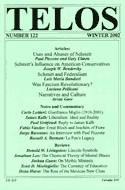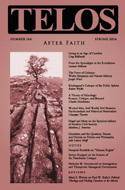By John Croce-Renard · Monday, March 13, 2023 When the Supreme Court rules in Students for Fair Admissions v. Harvard, it will surely declare that the use of racial preferences in higher education admissions violates the U.S. Constitution. There is some uncertainty about the precise shape its arguments will take, and their scope, but the basic outcome is clear enough. Here are seven reasons to welcome it from the standpoint of some traditional concerns of Telos.
First, a ruling against race-based affirmative action will diminish the material interests at stake in racial identity politics. It will thereby undercut the racialism that lies at the ideological heart of the liberal managerial establishment. Individual good intentions notwithstanding, the Tories of the managerial class use this insidious set of principles and rhetorical moves to justify their power and to bludgeon the working- and private sector middle classes.
Second, the ruling may enable colleges and universities to overcome the morally degrading culture of lies that the existence of racial preferences has spread throughout higher education, beginning in the elaborate charade that all applicants for admission or employment are judged by common criteria. It will help individual members of those communities to live in truth.
Continue reading →
By Russell A. Berman · Monday, August 8, 2022 The following comments refer to Mathieu Slama’s “How Brilliant Scientists Damage Democracy,” which appears here.
Among the many features of the COVID crisis, one stands out as particularly consequential: the attribution of ultimate and exclusive authority to science. Public statements abounded urging that we “follow the science,” and signs popped up on front lawns across the country advertising that the residents “believe in science”—as if science were a matter of belief rather than skepticism, observation, and experimentation. There was of course little attention to alternative scientific claims or debates within science. Instead of a scientific event, we witnessed the assertion of authority by way of the invocation of science or of what came to pass as “science.” The mandate to “follow the science” blindly has come to mean “follow the leader,” with no questions asked.
For large swaths of the public, the scientific label carries with it the implication of veracity: science, as opposed to religion (which is otherwise the proper subject matter of belief), is truth. Indeed the equation is a formula for modernity, which is why bizarre variants of modernization repeatedly cast themselves in the role of science: for Communism, the “science of Marxism-Leninism,” and for Nazis, “race science.” Nor do we have to look that far afield to those extreme cases in order to find reason to question the absolute truth claim of science. One can point to scandals like the Tuskegee experiment and to the regular reports of fraud and retractions, even in the most prestigious scientific journals. Just recently one reads that research reported in the journal Nature concerning Alzheimer’s may have been fraudulent. Following that science probably wasted millions of research dollars.
Continue reading →
By Mark Wegierski · Thursday, October 26, 2017 The following paper was presented at the conference “After the End of Revolution: Constitutional Order amid the Crisis of Democracy,” co-organized by the Telos-Paul Piccone Institute and the National Research University Higher School of Economics, September 1–2, 2017, Moscow. For additional details about the conference as well as other upcoming events, please visit the Telos-Paul Piccone Institute website.
This presentation compares two societies, which, although both claim to be “Western” as well as vibrant liberal democracies, are in many aspects quite different. Those societies have been shaped by their history and political culture to evolve in quite different directions. Nevertheless, they can both be seen as “post-revolutionary” societies.
Poland has had a very checkered history, from being a Great Power, to disappearing from the map of Europe, which has contributed to a strongly “erotic” sense of belonging among the Poles. Poland after 1989—the so-called Third Republic—has been in the difficult process of attempting a restoration of a more traditional Polish society, whose organic evolution and development had been so cruelly interrupted since 1939.
Continue reading →
By Michael Millerman · Tuesday, August 12, 2014  Like Spinoza, many liberal thinkers have defined the liberty they promote in terms of the necessity of submitting to the law that guarantees it. This is a unique kind of rule of law, a rule of the “‘politically correct,’ universalist, managerial-liberal” (9) law of contemporary liberals. Both internationally and domestically, this law requires the muscular imposition of questionable political, moral, and economic principles, by means of an insidious and often nauseating bureaucratic, technocratic, mediacratic apparatus, onto largely unwilling publics. Crucially, the freedom championed by such liberals and allegedly secured by their law does not include the freedom to refuse their domination root and branch. Like Spinoza, many liberal thinkers have defined the liberty they promote in terms of the necessity of submitting to the law that guarantees it. This is a unique kind of rule of law, a rule of the “‘politically correct,’ universalist, managerial-liberal” (9) law of contemporary liberals. Both internationally and domestically, this law requires the muscular imposition of questionable political, moral, and economic principles, by means of an insidious and often nauseating bureaucratic, technocratic, mediacratic apparatus, onto largely unwilling publics. Crucially, the freedom championed by such liberals and allegedly secured by their law does not include the freedom to refuse their domination root and branch.
Continue reading →
By Nicholas W. Drummond · Thursday, May 1, 2014 Nicholas W. Drummond’s “Immigration and the Therapeutic Managerial Government” appears in Telos 166 (Spring 2014). Read the full version online at the Telos Online website, or purchase a print copy of the issue in our store.
 Multiculturalism as state policy in the Western World has functioned without serious complications because an unequivocal division existed between the oppressive culture group and the culture groups requiring protection. Recent evidence suggests this distinction may be fading and the consequences are likely to be significant. Managerial governments traditionally accommodating towards diverse cultures are beginning to critically evaluate immigrant communities feared to be afflicted with objectionable pathologies like the tendency of some Islamic groups to promote gender inequality, homophobia, and Sharia law. Multiculturalism as state policy in the Western World has functioned without serious complications because an unequivocal division existed between the oppressive culture group and the culture groups requiring protection. Recent evidence suggests this distinction may be fading and the consequences are likely to be significant. Managerial governments traditionally accommodating towards diverse cultures are beginning to critically evaluate immigrant communities feared to be afflicted with objectionable pathologies like the tendency of some Islamic groups to promote gender inequality, homophobia, and Sharia law.
Continue reading →
|
|
 Like Spinoza, many liberal thinkers have defined the liberty they promote in terms of the necessity of submitting to the law that guarantees it. This is a unique kind of rule of law, a rule of the “‘politically correct,’ universalist, managerial-liberal” (9) law of contemporary liberals. Both internationally and domestically, this law requires the muscular imposition of questionable political, moral, and economic principles, by means of an insidious and often nauseating bureaucratic, technocratic, mediacratic apparatus, onto largely unwilling publics. Crucially, the freedom championed by such liberals and allegedly secured by their law does not include the freedom to refuse their domination root and branch.
Like Spinoza, many liberal thinkers have defined the liberty they promote in terms of the necessity of submitting to the law that guarantees it. This is a unique kind of rule of law, a rule of the “‘politically correct,’ universalist, managerial-liberal” (9) law of contemporary liberals. Both internationally and domestically, this law requires the muscular imposition of questionable political, moral, and economic principles, by means of an insidious and often nauseating bureaucratic, technocratic, mediacratic apparatus, onto largely unwilling publics. Crucially, the freedom championed by such liberals and allegedly secured by their law does not include the freedom to refuse their domination root and branch.  Multiculturalism as state policy in the Western World has functioned without serious complications because an unequivocal division existed between the oppressive culture group and the culture groups requiring protection. Recent evidence suggests this distinction may be fading and the consequences are likely to be significant. Managerial governments traditionally accommodating towards diverse cultures are beginning to critically evaluate immigrant communities feared to be afflicted with objectionable pathologies like the tendency of some Islamic groups to promote gender inequality, homophobia, and Sharia law.
Multiculturalism as state policy in the Western World has functioned without serious complications because an unequivocal division existed between the oppressive culture group and the culture groups requiring protection. Recent evidence suggests this distinction may be fading and the consequences are likely to be significant. Managerial governments traditionally accommodating towards diverse cultures are beginning to critically evaluate immigrant communities feared to be afflicted with objectionable pathologies like the tendency of some Islamic groups to promote gender inequality, homophobia, and Sharia law.

